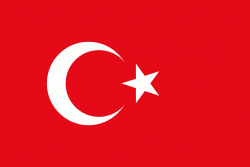Kağıthane (Kâğıthane)
Kağıthane means 'paper house' in Turkish. The area formed part of the popular picnicking area known as the Sweet Waters of Europe.
The mayor is Mevlüt Öztekin of the governing Ak Parti. Kâğıthane was part of Beyoğlu until 1954 and part of Şişli between 1954 and 1987.
Neighbourhoods of Kâğıthane include Seyrantepe, Hamidiye, Çağlayan, Merkez (centre) and Gültepe. Kağıthane is served by the metro lines M7 and M11 and Çağlayan served by M7 only.
During the reign of Suleiman the Magnificent Kâğıthane, then Sadâbad, was an extensively forested area used by the Ottoman court for hunting, riding and other equestrian pursuits. In the 17th and 18th centuries the area became increasingly fashionable especially during the Tulip Age reign of Sultan Ahmed III when many nobles had mansions and palaces built here. In particular the Sadabad Palace was built here for the statesman Yirmisekiz Mehmet Çelebi in 1722. It was destroyed in 1730 during the uprising against court excesses known as the Patrona Halil Revolt. Scant traces of the mansions and fountains that once graced the area can be seen in a small open-air museum in the grounds of the Kağıthane Municipallity (Kağıthane Belediyesi).
During the resign of Sultan Selim III some of the mansions and palaces were rebuilt, as they were again in the mid-19th century when Krikor Balyan was employed to bring Sadabad back to life. Paintings and drawings from the late 19th and early 20th centuries still show Kağıthane as a beauty spot to which locals would flock on Fridays.
In 1727 a paper factory and printing house were built in Sadâbad but both collapsed after the religious authorities refused permission for the printing of Korans. The modern name, Kağıthane, commemorates that development.
After the founding of the Turkish Republic in 1923, the northern end of the Golden Horn was turned into an industrial zone. Sadâbad became home to numerous factories. From the 1950s onwards settlement of the Kâğıthane area began with illegal slums (known as gecekondus in Turkish) as thousands of migrants moved from Anatolia to work in the factories, building sites or services sector. Eventually, the gecekondus were legalised and replaced by residentially-zoned buildings.
In the early 21st century Kâğıthane was rapidly transformed by urban regeneration projects due to its central location and connections to the new intra-city transport networks.
Map - Kağıthane (Kâğıthane)
Map
Country - Turkey
 |
|
| Flag of Turkey | |
One of the world's earliest permanently settled regions, present-day Turkey was home to important Neolithic sites like Göbekli Tepe, and was inhabited by ancient civilisations including the Hattians, Hittites, Anatolian peoples, Mycenaean Greeks, Persians and others. Following the conquests of Alexander the Great which started the Hellenistic period, most of the ancient regions in modern Turkey were culturally Hellenised, which continued during the Byzantine era. The Seljuk Turks began migrating in the 11th century, and the Sultanate of Rum ruled Anatolia until the Mongol invasion in 1243, when it disintegrated into small Turkish principalities. Beginning in the late 13th century, the Ottomans united the principalities and conquered the Balkans, and the Turkification of Anatolia increased during the Ottoman period. After Mehmed II conquered Constantinople (Istanbul) in 1453, Ottoman expansion continued under Selim I. During the reign of Suleiman the Magnificent, the Ottoman Empire became a global power. From the late 18th century onwards, the empire's power declined with a gradual loss of territories. Mahmud II started a period of modernisation in the early 19th century. The Young Turk Revolution of 1908 restricted the authority of the Sultan and restored the Ottoman Parliament after a 30-year suspension, ushering the empire into a multi-party period. The 1913 coup d'état put the country under the control of the Three Pashas, who facilitated the Empire's entry into World War I as part of the Central Powers in 1914. During the war, the Ottoman government committed genocides against its Armenian, Greek and Assyrian subjects. After its defeat in the war, the Ottoman Empire was partitioned.
Currency / Language
| ISO | Currency | Symbol | Significant figures |
|---|---|---|---|
| TRY | Turkish lira | ₺ | 2 |
| ISO | Language |
|---|---|
| AV | Avar language |
| AZ | Azerbaijani language |
| KU | Kurdish language |
| TR | Turkish language |















